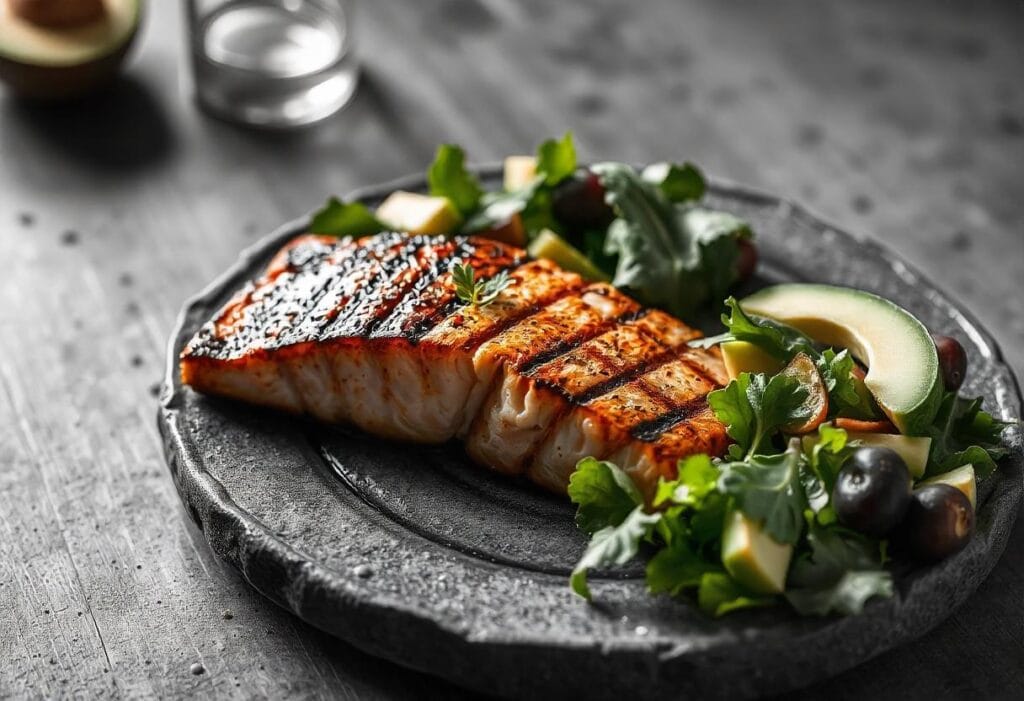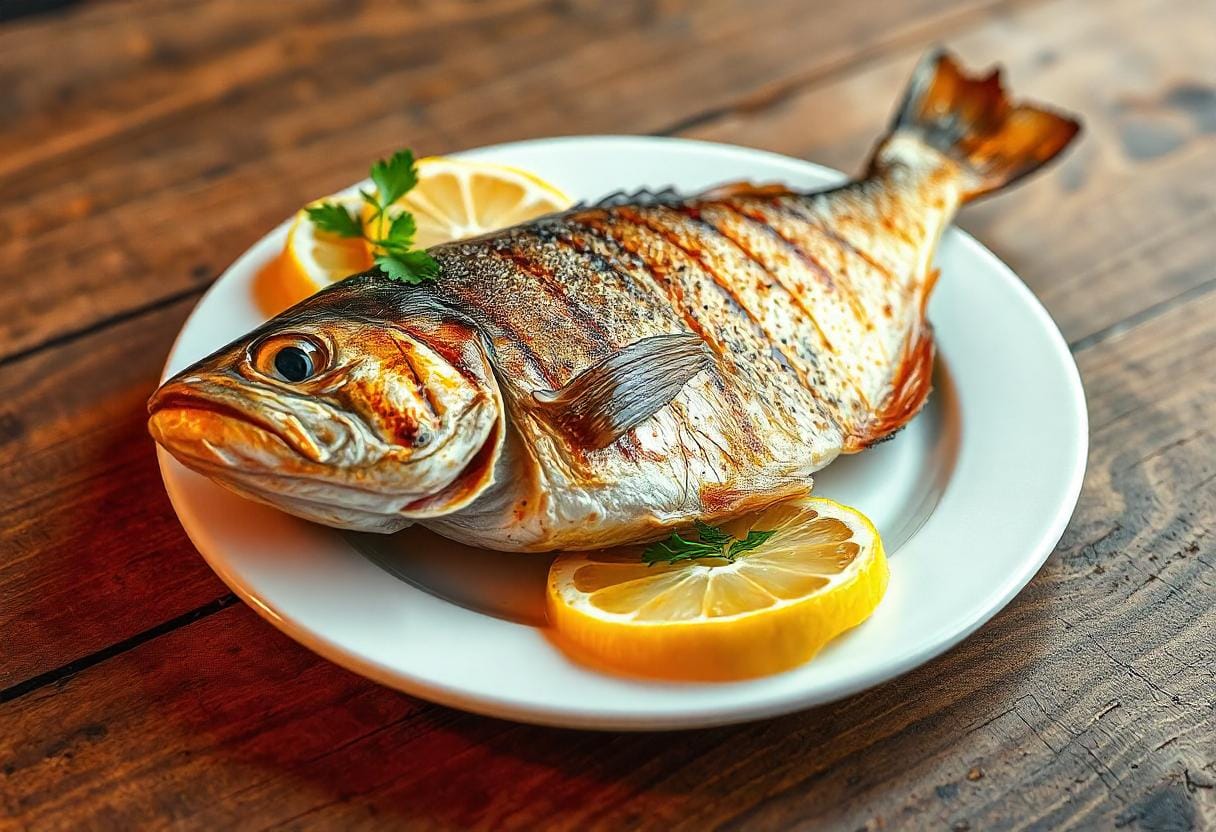Table of Contents
Introduction to Grilling: Which Fish is Best for Grilled Fish?
Grilling fish is a time-honored technique, known for creating delicious, smoky flavors while keeping the fish moist and tender. Finding the best fish for grilling is essential to achieving those perfect results everyone loves. The best fish for grilling will hold up well to heat while retaining moisture and flavor. Finding the best fish for grilling is essential to achieving those perfect results everyone loves. The best part? Grilling fish is quick, simple, and an incredibly flavorful way to enjoy a healthy, protein-packed meal. Grilled fish is a reliable and delicious choice, whether for a casual dinner or a barbecue.
Grilling fish isn’t always straightforward. Different types of fish have varying textures, fat content, and moisture levels, all of which impact how well they perform on the grill. For expert tips on grilling techniques, explore the best way to cook fish on the grill.
Some fish are ideal for grilling, while others might disintegrate or dry out too easily. Choose the right fish, prepare it properly, and master your grilling technique.
Let’s dive into the world of grilled fish and uncover everything you need to know about selecting the best fish for grilling.
How Grilling Brings Out the Best in Fish
When you select the best fish for grilling, you’re not just choosing a protein—you’re setting the stage for an experience that intensifies the natural flavors of the fish. The process of grilling adds a distinct smoky flavor that can’t be replicated by other cooking methods. The high heat of the grill causes the fish’s proteins to caramelize, forming a delicious golden-brown crust. If you’re interested in alternative cooking techniques, check out what is the best method of cooking trout.
Through the Maillard reaction. This reaction locks in the juices, helping the fish retain moisture and tenderness on the inside while achieving a perfectly crisp exterior.
The smoky aroma, the crackling sound, and the sizzle of the fish on the grill all contribute to the experience, making grilling not just a cooking method but a flavorful adventure. Every bite is a celebration of fire, flavor, and freshness.
Factors to Consider: Choosing the Best Fish for Grilling
When searching for the best fish for grilling, it’s important to understand that not all fish are created equal. Some varieties are more suited to the grill due to their texture, fat content, and cooking properties.To help you make the best choice, let’s explore the essential factors to consider when choosing fish for grilling.
Texture and Firmness of the Fish
The texture and firmness of the fish are crucial when selecting the best fish for grilling. When identifying the best fish for grilling, look for varieties with a meaty, firm texture as they hold their shape and don’t fall apart easily. Fish with a meaty, firm texture are ideal for grilling, as they hold their shape and don’t fall apart easily. Flaky, delicate fish can be harder to manage on the grill and may stick to the grates or fall apart during cooking.
Firm fish like swordfish, tuna, mahi-mahi, and salmon have a denser flesh that can withstand the high heat of the grill without falling apart. These fish maintain their structure and offer a satisfying bite, making them perfect for grilling.
Fat Content and Its Role in Grilling
Fat plays an important role in grilling fish. Among the best fish for grilling, oily varieties such as salmon, mackerel, and trout contain higher levels of fat, which helps to keep them moist and juicy during the cooking process. Oily fish such as salmon, mackerel, and trout contain higher levels of fat, which helps to keep the fish moist and juicy during grilling. The fat content also imparts a richer flavor to the fish, making it more succulent and tender when cooked.
Fatty fish like salmon are less likely to dry out than lean fish like cod or tilapia. The fat serves as a natural barrier, helping the fish retain moisture while grilling. This makes oily fish an excellent choice for grilling.
Availability and Sustainability
In today’s world, sustainability is an important consideration when purchasing fish. Overfishing is a real concern, and choosing sustainable seafood is crucial for preserving marine ecosystems. When selecting fish for grilling, look for sustainably sourced options. Certifications such as the Marine Stewardship Council (MSC) label indicate that the fish has been caught in a way that supports healthy fish populations and minimizes environmental impact.
You can also ask your fishmonger about the sustainability of the fish you’re purchasing. Opting for sustainable fish not only supports the health of the oceans but also allows you to enjoy grilled fish with a clear conscience.
Top Choices: Which Fish is Best for the Grill?
Now that we understand the key factors to consider, let’s explore the best fish for grilling and why these specific varieties are ideal for this cooking method.

A selection of the best fish for grilling, showcasing their firm texture and appealing grill marks that make these varieties ideal for barbecue cooking.Salmon: The Grilling Superstar
Salmon is undoubtedly one of the best fish for grilling due to its rich, buttery texture and slightly sweet flavor that make it a perfect choice for the grill. Its rich, buttery texture and slightly sweet flavor make it a perfect choice for the grill. Wondering how it compares to other fish? Read does steelhead trout cook the same as salmon?.
The firm, meaty flesh holds up well on the grill and is less likely to fall apart, which makes it a favorite among grill enthusiasts.
Salmon is also incredibly versatile and can be grilled with or without the skin. Many people prefer to grill it with the skin on, as it helps to keep the fish intact and adds an extra layer of crispy texture.
Pro Tip: To prevent salmon from sticking to the grill, always grill it skin-side down for the first few minutes. The skin acts as a natural barrier, making it easier to flip the fish and ensuring it doesn’t stick to the grates.
Tuna: Perfect for Grilling
Tuna has a thick, meaty texture that makes it among the best fish for grilling, especially for those who enjoy a bolder, steak-like fish experience. It’s ideal for those who enjoy a bolder, steak-like fish. Tuna steaks are seared on the outside and remain rare or medium-rare inside, retaining their moisture and tenderness.
Tuna also pairs well with bold marinades, such as soy sauce, sesame oil, and ginger, making it a favorite choice for those who enjoy experimenting with different flavor profiles.
Mahi-Mahi: Versatile and Flavorful
Mahi-mahi, also known as dolphinfish, is a firm, white fish with a mild flavor. Its firm texture makes it perfect for grilling, and it’s a popular choice in tropical and seafood-themed recipes. Mahi-mahi is also versatile enough to pair with a variety of seasonings and sauces, from citrus marinades to tropical salsas.
The slightly sweet flavor of mahi-mahi complements grilled vegetables, fruits like pineapple or mango, and tangy sauces, making it a great choice for grilling during summer months or tropical-themed meals.
Swordfish: Ideal for Bold Flavors
Swordfish is often referred to as the « steak of the sea, » and for good reason. Its dense, meaty texture makes it perfect for grilling, and it holds up well to bold spice rubs, marinades, or citrus-based sauces. Swordfish can be grilled in thick steaks, making it a great option for those who prefer a hearty, steak-like fish.
Swordfish’s mild flavor allows it to be paired with a wide range of seasonings, from Mediterranean herbs to spicy barbecue rubs, making it a versatile choice for the grill.
Snapper: Light and Flavorful
Snapper is a delicate, slightly sweet fish that is perfect for grilling whole. The mild flavor makes it a great option for those who prefer lighter fish, while the firm texture ensures it holds up well on the grill. Grilled whole snapper is often stuffed with fresh herbs, garlic, and lemon slices, creating an aromatic and visually stunning dish that’s perfect for serving at dinner parties or special occasions.
How to Get Your Fish Ready for the Grill

Cleaning and Marinating Tips
Before grilling, it’s essential to clean and prepare your fish properly. Pat the fish dry with paper towels to remove excess moisture, as a wet fish can stick to the grill. If you’re grilling fish fillets, make sure they’re free from bones or scales.
Marinating your fish is optional but can significantly enhance the flavor. A marinade infuses the fish with flavor and keeps it moist during grilling. Try simple lemon and olive oil or bold soy-ginger and citrus marinades.
Simple Marinade Recipe:
- 2 tablespoons olive oil
- 1 tablespoon lemon juice
- 1 clove garlic (minced)
- 1 tablespoon fresh herbs (such as parsley or dill)
- Salt and pepper to taste
Mix these ingredients together and coat the fish evenly. Let it sit in the marinade for at least 30 minutes before grilling to allow the flavors to develop.
Grilling Fish: Must-Have Tools for Success

The right tools can make grilling fish a breeze, even when you’re working with the best fish for grilling like salmon or swordfish. Here are some essential tools you’ll need:
- Grill Basket: A grill basket is a must-have for grilling smaller fish or fish fillets. It prevents the fish from falling through the grates and allows for easy flipping.
- Fish Spatula: A fish spatula is designed to flip delicate fish fillets with ease. It has a thin, flexible blade that allows you to slide under the fish without breaking it.
- Meat Thermometer: A meat thermometer ensures your fish is cooked to the right temperature, avoiding overcooking or undercooking.
- Basting Brush: Use a basting brush to apply marinades or oils evenly on the fish, helping it stay moist and flavorful while grilling.
Common Problems When Grilling Fish and How to Avoid Them
Grilling fish can be challenging, especially if you’re new to the process. Here are some common problems and how to avoid them:
- Fish Sticking to the Grill: Oil both the grill grates and the fish to prevent sticking. A fish basket or grilling the fish on a piece of foil can also help.
- Overcooking: Fish cooks quickly, and overcooking is a common mistake. Keep a close eye on the cooking time, and use a thermometer to ensure the fish reaches an internal temperature of 145°F (63°C).
- Uneven Cooking: To avoid uneven cooking, preheat the grill evenly and consider using indirect grilling for thicker cuts of fish.
Perfect Grilled Fish: Techniques for Various Cuts
Direct vs. Indirect Grilling
- Direct Grilling: Best for thinner fish fillets like snapper, trout, or salmon. The fish is placed directly over the flame, which gives it a nice char on the outside while keeping it moist on the inside.
- Indirect Grilling: Ideal for thicker cuts like swordfish steaks or whole fish. Place the fish on the cooler side of the grill, allowing it to cook more slowly and evenly without burning the exterior.
Best Grilling Temperatures for Fish
Preheat your grill to medium-high heat (around 375°F to 450°F, or 190°C to 232°C). This temperature ensures the fish sears nicely without drying out. If you’re unsure about the temperature, hold your hand 5 inches above the grill grates—if you can hold it there for 3-4 seconds, you’re in the right range.
Delicious Grilled Fish Recipes to Try
- Classic Grilled Salmon with Lemon Butter: This simple recipe involves grilling salmon fillets and drizzling them with a buttery lemon sauce.
- Grilled Tuna with Soy Ginger Marinade: A quick marinade of soy sauce, ginger, and sesame oil adds incredible flavor to tuna steaks.
Health Benefits of Eating Grilled Fish
Grilled fish is not only delicious but also packed with health benefits. Rich in omega-3 fatty acids, grilled fish promotes heart health and improves brain function. It’s also a lean source of protein, making it ideal for those watching their calorie intake or looking to build muscle.
Conclusion: Mastering the Art of Grilling Fish
Grilling fish may seem intimidating at first, but by selecting the best fish for grilling and using the right preparation techniques, you’ll soon be able to create perfectly grilled fish every time. Whether you’re grilling salmon, tuna, or snapper, choosing the right fish and following these tips will ensure a delicious and satisfying meal.
By experimenting with different grilling techniques, marinades, and seasonings, you’ll elevate your grilling game. Need more tips? Explore Golden’s Recipes for more grilling guides.
The world of grilled fish is full of flavor, and with a bit of practice, you’ll be able to master it in no time.

